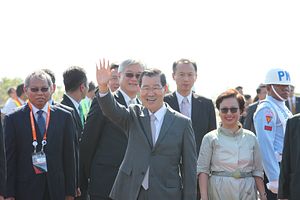Taiwan’s President Ma Ying-jeou has appointed former Vice President Vincent Siew as Taiwan’s representative at the upcoming APEC leaders’ summit to be held in Beijing. The announcement officially quashes what small hope there was that Ma himself would attend the summit and hold an historic meeting with Chinese President Xi Jinping.
Taiwan, unlike other APEC members, routinely sends not its head of government but an appointed official (and often a retired one) to the leaders’ summit. Former Vice President and KMT Chairman Lien Chan attended APEC as Ma Ying-jeou’s envoy from 2008 to 2012. Last year, Siew (who was Ma’s vice president until 2012) took over. Ma Ying-jeou’s office announced Wednesday that Siew will attend again this year.
Before that announcement, some in Taiwan were hopeful that Xi Jinping would seek to make a grand historic gesture by inviting Ma himself to attend the leaders’ summit. As Chen-shen J. Yen wrote for The Diplomat back in September, China’s position as host nation could provide enough flexibility for the CCP to accept Ma’s presence.
Ma’s administration expressed their own hopes for a Ma-Xi summit. In July, Premier Jiang Yi-huah confirmed that he was trying to persuade Beijing to have Ma attend the APEC summit in person. Ma himself has said that he believes the APEC meeting would be a good opportunity for the leaders of Taiwan and the PRC to meet.
The terminology is crucial here. APEC members are not required to be states but “economies.” This makes Taiwan’s inclusion (under the name “Chinese Taipei”) acceptable to Beijing; Hong Kong is also an APEC member economy and sends it own representative. Mainland China routinely blocks Taiwan from being represented in organizations that require statehood as a prerequisite for membership. Because APEC is based on economies not states, it is one of the few international organizations that includes Beijing as well as Taipei.
APEC economies are represented at the annual summit by “leaders” rather than the official “heads of government,” again potentially allowing the PRC the flexibility to accept Ma’s presence. This was the argument made by KMT officials, at least, but Beijing did not buy that argument. In late September, a Taiwan Affairs Office spokesperson told reporters that an international summit was not the proper venue for a hypothetical Ma-Xi summit. A meeting between the leaders on both sides of the strait is strictly a cross-strait affair, the TAO stressed, not something that needs to play out at an international meeting.
Indeed, from Beijing’s perspective, having a Ma-Xi summit at APEC might be the worst possible way to do it. The PRC is incredibly sensitive about any actions that seem to grant legitimacy to Taiwan’s government on the world stage. Having Taiwan’s president (even if he is going by the more benign term of “leader”) rubbing elbows with the heads of government of 19 countries would sent the tacit message that Taiwan’s government is on the same level as the other states – the PRC included.
Thus, Ma Ying-jeou’s attendance at APEC touches on the core of the cross-strait issue, which is the extent to which the Republic of China government has sovereignty over Taiwan. As Richard Bush argues in his book Uncharted Strait, it is disagreement over this issue that still prevents any political movement in cross-strait ties. Simply put, Beijing will not recognize the right of Taipei to govern Taiwan independently of PRC oversight. This sovereignty issue spills over into the question of Taiwan’s representation in international organizations. China’s general argument is that Taiwan is part of China, so its people are already represented by Beijing’s inclusion. As a result, mainland China is loath to allow Taiwan’s government any more representation on the global stage, despite a marked thaw in cross-strait relations since Ma assumed office in 2008.
Despite Ma’s best efforts, Taiwan has been unable to gain observer status in international bodies like the World Health Organization or the International Civil Aviation Organization. Beijing allows Taipei to participate as a “guest,” which is progress of the frustratingly-slow variety. As Bonnie Glaser pointed out in her 2013 report on “Taiwan’s Quest for Greater Participation in the International Community,” Beijing is in something of a bind. On one hand, it does not want to encourage perceptions of Taiwanese independence by allowing the ROC government to take part in international organizations. On the other hand, however, Ma has prioritized greater international participation. Stonewalling these initiatives despite the cross-strait thaw embraced by the current KMT government reflects poorly on the Ma Ying-jeou administration and reinforces perceptions in Taiwan that better cross-strait relations won’t lead to tangible benefits.
From Beijing’s perspective, allowing Ma Ying-jeou to attend the APEC summit involved taking a big risk (granting the ROC international prestige) for an uncertain reward (hypothetical goodwill in Taiwan). It’s not surprising that Xi Jinping decided not to take this gamble, especially given the PRC’s reticence to give Taiwan more participation in far less prestigious organizations like ICAO.
From Taipei’s perspective, however, the APEC summit would have been one of the more domestically palatable ways to frame a Ma-Xi summit. There’s a lot of unease about the political ramifications for Taiwan, but if such a move was coupled with greater ROC participation in an international forum it would be far easier to embrace. Now that Siew has been announced as Taiwan’s representative, the chances of a Ma-Xi meeting just got even slimmer.

































